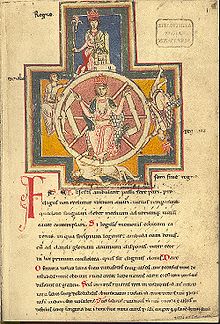
O Fortuna
Encyclopedia
"O Fortuna" is a medieval Latin
Goliard
ic poem written early in the thirteenth century, part of the collection known as the Carmina Burana
. It is a complaint about fate, and Fortuna
, a goddess in Roman mythology
and personification of luck
.
In 1935/36, O Fortuna was set to music by the German composer Carl Orff
for his cantata
Carmina Burana
where it is used as the opening and closing number. It opens on a slower pace with thumping drums and choir that drops quickly into a whisper building slowly into a steady crescendo of drums and short string and horn notes peaking on one last long powerful note and ending abruptly. A performance takes a little over two and a half minutes.
Orff's setting of the poem has become immensely popular and has been performed by countless classical music ensembles and popular artists. It can be heard in numerous movies and television commercials and has become a staple in popular culture, setting the mood for dramatic or cataclysmic situations. "O Fortuna" topped a list of the most-played classical music of the past 75 years in the United Kingdom.

Medieval Latin
Medieval Latin was the form of Latin used in the Middle Ages, primarily as a medium of scholarly exchange and as the liturgical language of the medieval Roman Catholic Church, but also as a language of science, literature, law, and administration. Despite the clerical origin of many of its authors,...
Goliard
Goliard
The Goliards were a group of clergy who wrote bibulous, satirical Latin poetry in the 12th and 13th centuries. They were mainly clerical students at the universities of France, Germany, Spain, Italy, and England who protested the growing contradictions within the Church, such as the failure of the...
ic poem written early in the thirteenth century, part of the collection known as the Carmina Burana
Carmina Burana
Carmina Burana , Latin for "Songs from Beuern" , is the name given to a manuscript of 254 poems and dramatic texts mostly from the 11th or 12th century, although some are from the 13th century. The pieces were written principally in Medieval Latin; a few in Middle High German, and some with traces...
. It is a complaint about fate, and Fortuna
Fortuna
Fortuna can mean:*Fortuna, the Roman goddess of luck -Geographical:*19 Fortuna, asteroid*Fortuna, California, town located on the north coast of California*Fortuna, United States Virgin Islands...
, a goddess in Roman mythology
Roman mythology
Roman mythology is the body of traditional stories pertaining to ancient Rome's legendary origins and religious system, as represented in the literature and visual arts of the Romans...
and personification of luck
Luck
Luck or fortuity is good fortune which occurs beyond one's control, without regard to one's will, intention, or desired result. There are at least two senses people usually mean when they use the term, the prescriptive sense and the descriptive sense...
.
In 1935/36, O Fortuna was set to music by the German composer Carl Orff
Carl Orff
Carl Orff was a 20th-century German composer, best known for his cantata Carmina Burana . In addition to his career as a composer, Orff developed an influential method of music education for children.-Early life:...
for his cantata
Cantata
A cantata is a vocal composition with an instrumental accompaniment, typically in several movements, often involving a choir....
Carmina Burana
Carmina Burana (Orff)
Carmina Burana is a scenic cantata composed by Carl Orff in 1935 and 1936. It is based on 24 of the poems found in the medieval collection Carmina Burana...
where it is used as the opening and closing number. It opens on a slower pace with thumping drums and choir that drops quickly into a whisper building slowly into a steady crescendo of drums and short string and horn notes peaking on one last long powerful note and ending abruptly. A performance takes a little over two and a half minutes.
Orff's setting of the poem has become immensely popular and has been performed by countless classical music ensembles and popular artists. It can be heard in numerous movies and television commercials and has become a staple in popular culture, setting the mood for dramatic or cataclysmic situations. "O Fortuna" topped a list of the most-played classical music of the past 75 years in the United Kingdom.
Poem

velut luna statu variabilis, semper crescis aut decrescis; vita detestabilis nunc obdurat et tunc curat ludo mentis aciem, egestatem, potestatem dissolvit ut glaciem. Sors immanis et inanis, rota tu volubilis, status malus, vana salus semper dissolubilis, obumbrata et velata michi quoque niteris; nunc per ludum dorsum nudum fero tui sceleris. Sors salutis et virtutis michi nunc contraria, est affectus et defectus semper in angaria. Hac in hora sine mora corde pulsum tangite; quod per sortem sternit fortem, mecum omnes plangite! |
like the moon you are changeable, always waxing or waning; hateful life first oppresses and then soothes as fancy takes it; poverty and power it melts them like ice. Fate – monstrous and empty, you whirling wheel, stand malevolent, well-being is vain and always fades to nothing, shadowed and veiled you plague me too; now through trickery, I bring my bare back to your villainy. Fate, in health and in virtue, is against me, driven on and weighted down, always enslaved. So at this hour without delay pluck the vibrating string; since Fate strikes down the strong man, everyone weep with me! |

